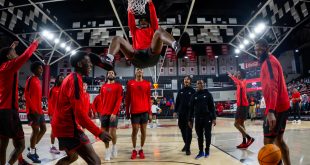For many student athletes, managing their mental health can be tougher than playing the sport they love.
For former college football and NFL player Tra Battle, he knows firsthand about struggling with mental health.
Battle, a former walk-on safety at the University of Georgia from 2003-2007 before spending six years in the NFL and United Football League, recently visited Valdosta to share his story. Battle was a guest speaker for We All Face Battles, an event put on by United2Prevent at The Porch Community Church on March 10.
While many athletes start their mental battles while still playing, Battle’s struggle didn’t begin until after retiring from football.
“As I was playing, you’re so consumed with the game,” Battle said. “For me at least, I was so consumed with the game that I really didn’t have time to think about myself or honestly think about anything else. It was eat, sleep, dream, wake up and play football. When that was over, and I had all this extra mental capacity to think about things other than football, I realized that there was a huge chasm of sorts between what I tried to be my entire life and what that looked like moving forward without the game of football.”
Battle’s bout with mental health only worsened as he lost some long-time friends. He added that this ultimately led to him nearly taking his life.
However, Battle was able to get the help he needed via former Georgia head coach Mark Richt.
“I ended up calling Coach Richt, and he end up getting me some help,” Battle said. “From that point forward, it was all about me.”
Some student athletes simply sit in silence, not knowing where or who to go to if they are struggling with mental health. Battle recalls not knowing where to turn to while in college but believes that Richt would’ve helped him get assistance should he have asked for it.
“I don’t know because I never had to utilize it,” Battle said on if assistance was available when playing for Georgia. “But the character of the man that Coach Richt is, I’m pretty sure if anyone needed it, if anyone else would have called him, it would have been the same response because that’s just how he loved his players.”
Following his struggles with mental health, Battle began to share his story with others. Additionally, Battle recently started Battle Solutions, allowing him to further share his message as a speaker while also helping improve leadership capabilities for leaders of organizations.
Battle believes that sharing his story is important to help destigmatize the idea that people shouldn’t ask for help as well as build a support community.
“Sharing my testimony, sharing my story to anyone who was feeling what I was feeling at that time would know that they want to hold on and that having the things of this world doesn’t mean that things are going to be peaches and cream or sunshine and rainbows,” Battle said. “Just because you amass a lot of material possessions and material fame doesn’t mean that you won’t fall susceptible to mental health. So really, [it’s important to] destigmatize who is susceptible to it, destigmatize having to have it all together and to not be afraid to ask for help. None of us were called to do life alone. We were called to be a community, and so I wanted to share my story to create a community of support.”
As for those who find themselves enveloped by the sport they play, particularly those who play football, Battle advises that players shouldn’t invest all of their energy into sports as it only makes up part of their lives.
“I put it in a mathematical perspective,” Battle said. “You may begin playing football like I did at the age of seven, and I retired around the age of 28. That’s just the first quarter. You still have the second quarter, halftime, third quarter, fourth quarter, and maybe even overtime in your life. When we think about the pressures of football and the effects it has on our mental health, it’s temporary. What I’ve heard [being] said recently is it’s not worth making lifelong or permanent solutions for temporary problems.”
Battle added that while every athlete wants to succeed, they also need to consider their personal lives beyond sports. This includes potentially having kids and one day getting married.
“Football matters because it may be something that we love to do, but life matters because of the people who love you and the love that you can give that you have for others,” Battle said. “Think about the rest of the game of life that you have to play, and don’t let it [football] stress you out. It’s a game. It’s literally a game.”
VSU students who are struggling with their mental health can visit the Student Health Center or reach out to people they entrust in for help.
Written by Austin Bruce, Sports Editor. Photo courtesy of Tra Battle.
 The Spectator The independent student newspaper of Valdosta State University
The Spectator The independent student newspaper of Valdosta State University





